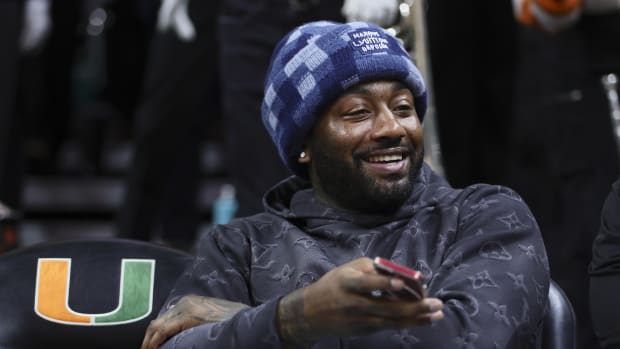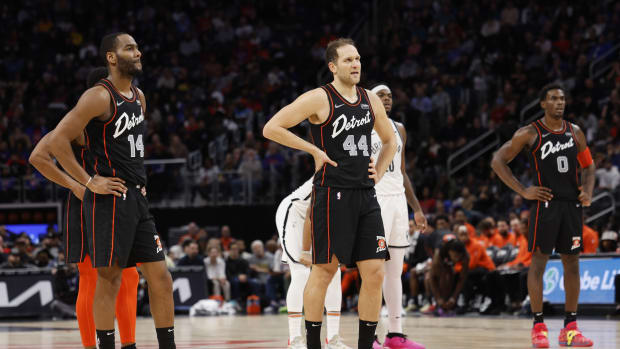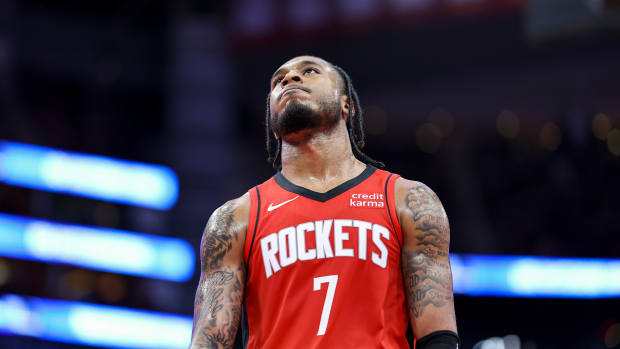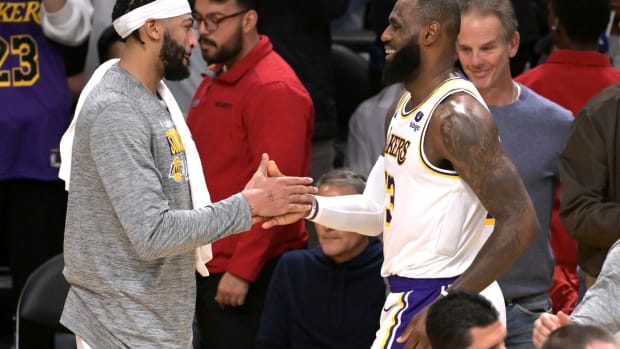2018-19 NBA First-Quarter Awards: Giannis Antetokounmpo Leads MVP Race
It’s around this time, with more than a quarter of the season in the books, that the NBA field begins to congeal into its eventual shape. Trends have faded or become real. Outlier performances have begun to wash out in the churn of the schedule. There is enough data on record to consider where the league stands, and within it, the players and teams who will come to define this season. With that, let’s take stock of the NBA’s various award races at the quarter-season mark, to get an initial sense of where things stand.
Most Valuable Player: Giannis Antetokounmpo, Bucks
Runners-up: 2. LeBron James (Lakers), 3. Stephen Curry (Warriors), 4. Anthony Davis (Pelicans), 5. Kevin Durant (Warriors)
This is the year of Giannis, the year of the Bucks, and the year of all who have been waiting for this particular superstar and team to finally work in harmony. It wasn’t enough to put the ball in Antetokounmpo’s hands and let him make plays. Milwaukee had to make room. Once it did, one of the most talented players in the league confirmed his claim as one of its most dominant—a dowhill force in a perimeter-oriented league. Antetokounmpo has long been an efficient scorer, but this season he’s climbed to 62% true shooting despite having one of the most predictable shot profiles in the sport. Everyone knows where Giannis wants to go and yet the best defenders and strategists in the world have thus far been powerless to stop him.
Some will prefer James for this award, and who are we to argue? The Lakers look far better than expected because they have a genius playmaker to help make sense of it all, and to find the best in any game’s most meaningful possessions. The case for Antetokounmpo, however, draws from a James staple: all-around contribution. Both have scored comparably and facilitated well, but Antetokounmpo is reaching absurd new highs as a rebounder while playing consistently high-level defense. There has never any doubt as to whether James can defend, only whether he cares to. His current mode on that end is somewhat relaxed: aware enough to dial it up in spots, but not about to make multiple efforts for a game in mid-December. That’s fine, and perhaps even wise given the length of the season and what the Lakers need of LeBron. It just makes his contrast with Antetokounmpo that much more clear.
ROLLINS: Stephen Curry and the Warriors Are Back on Track
Below those two, there is a divide, if only because Curry has missed a few too many games. On the merit of his performances, however, Curry is right there—as valuable in play (and absence) as anyone in the league. The rest of the ballot is more malleable. For now, those final two spots belong to Davis for salvaging the inconsistent Pelicans, and Durant, who without Curry (and Draymond Green) has done damn near everything for the defending champions. Joel Embiid will have his say before the season is through, as will Kawhi Leonard. For any challenger to crack the top three, however, would require a significant injury or a real change in the substance of performance. Antetokounmpo, James, and Curry have set themselves apart.
Sixth Man of the Year: Montrezl Harrell, Clippers
Runners-up: Domantas Sabonis (Pacers), Julius Randle (Pelicans)
This award is generally a matter of taste between a few decent options, with the final vote leaning toward whichever bench player happened to score the most. This year is different. As of today, there are more than a half-dozen credible candidates, each compelling in their own way. Harrell deserves to be the early favorite for the way he’s energized the Clippers—the beating heart behind one of the league’s most surprising teams. Scaling up from 17 to 26 minutes hasn’t cost Harrell an ounce of urgency. Every one of his screens is still followed by a hard, immediate roll, and every loose ball chased down with the same relentless pursuit.
What results is an amazing strain of per-minute hyperactivity. If it weren’t enough that Harrell manages 22.1 points, 9.8 rebounds, 1.3 steals, and 2.3 blocks every 36 minutes, one could be compelled by just how much value Harrell wrings from every opportunity. This is more than hustle. By any definition, Harrell ranks among the most efficient scorers in the league. Where others might settle for a floater, Harrell powers through for a layup. Speed allowed Harrell to beat other bigs to particular spots, but it’s his read on the game—and all its many seams—that gets him wherever he needs to go. And it’s Harrell’s competitive, improving defense that keeps him on the floor when it matters most. For all of the lineup permutations the Clippers have at their disposal, there is rarely a question as to which center will close out games. Harrell has earned every possible benefit of the doubt.
Sabonis, who has often been the best player for the 16-10 Pacers, and Randle, whose play warrants some legitimate All-Star consideration, are fantastic candidates in their own right. I slightly prefer their contributions to some of the alternatives, yet one could justify an entirely different three-man ballot in good faith. All due credit to these three bigs, but Derrick Rose, Spencer Dinwiddie, Lou Williams, and Dennis Schröder are all on the cusp of claiming a spot.
Defensive Player of the Year: Robert Covington, Timberwolves
Runners-up: Paul George (Thunder), Giannis Antetokounmpo (Bucks)
The most convincing defender of this young season is the man who has made two very different teams—each with their own scheme—worlds better with his presence. Covington is an unusual wing in that lockdown, one-on-one defense isn’t precisely his specialty. His best work comes in the floor game. When opponents start into their favorite sets, Covington is two steps ahead, cutting off angles and options before they ever fully develop. The passes that give an offense its rhythm are suddenly ground that must be negotiated. In the three seasons that hustle stats have been available on NBA.com, Covington has ranked first in the league in deflections each time.
Crossover Staff: The NBA Season's Worst Rebuilding Situations
For the Sixers, that meant that Covington could run interference while Joel Embiid, one of the league’s best rim protectors, played safety. Once he was traded to the Timberwolves as a centerpiece of the Jimmy Butler deal, his awareness and focus became a galvanizing force in itself. One can’t fully credit Covington for the fact that Minnesota looks like a completely different team since the trade, though he is a critical reason why the Wolves had been a top-five defense since. It’s rare for a wing defender to have such a broad impact. Yet considering the style of Covington’s defensive play, it’s easiest to see his impact—every stunt and rotation and challenge and recovery—from a panoramic view.
The remaining spots are where things get tricky. George has a great case as the single best defender behind the league’s best defense, but only a slightly better case than Steven Adams. How those two split the vote—and whether playing together costs one of them the award – will be a fascinating subplot at season’s end. Crashing the party (and bumping Adams off this ballot) is Antetokounmpo, whose catch-all defense has been as intimidating as it is effective. Opponents are feeling Milwaukee’s length again, with their hesitation if not their turnovers, and Antetokounmpo is a big reason why.
Coach of the Year: Doc Rivers, Clippers
Runners-up: Mike Budenholzer (Bucks), Nate McMillan, (Pacers)
One of the complications of the eventful start to this NBA season is that there is no way to parse this award race but to wrong ranks of deserving and qualified coaches. Nevertheless, Rivers has done something remarkable this season to hone this particular Clippers roster to playoff quality. The West is particularly uncompromising this year—as evidenced by the fact that the Rockets, a conference finalist last season, currently sit in 14th place—but the Clippers have carved out a lane in the playoff race by playing a style of basketball that suits them. Rivers has effectively juggled the talents of three scorers, none of whom is an above-average passer for their position. Where a lesser coach might have let Shai Gilgeous Alexander work in the background behind veteran guards, Rivers has found room for the rookie to start and to contribute. This group, by the basic structure of its roster, should not rank 10th in net rating—or seventh, after adjusting for strength of schedule. Yet here they are, synergizing in all the right ways and consistently challenging the class of the league. These Clippers are damn good. Credit the players, first, but then the coach who arranges their minutes and dictates their roles a makes way for them to succeed.
Giving Rivers that nod means not giving it to Budenholzer, whose designs have unleashed the Bucks as a terror upon the league. There has been no clearer example of the impact of coaching than what’s gone in Milwaukee. At Budenholzer’s urging, he Bucks have dramatically updated their shot profile, turning their offense fast and lean. Reining in the defense has made Milwaukee less exploitable, allowing experienced defenders to accomplish more by doing a little less. Budenholzer might deserve the award for the ease he’s brought for Antetokounmpo alone; Milwaukee’s ascendant star has never had it so easy as when the floor is this well spaced on every set and every break. Among all the other coaches to consider, McMillan stands out for how his Pacers, still sitting pretty at fourth in the East, have survived playing much of this season without Victor Oladipo. Scoring may not come easy for Indiana these days, but they scrap out wins by making it that much harder for every team they play against.
Most Improved Player: Pascal Siakam, Raptors
Runners-up: Derrick Rose (Timberwolves), Nikola Vučević (Magic)
What a quarter-season it’s been for Siakam, who has captured the hearts of the League Pass faithful and a starting spot for one of the NBA’s best teams to date. His rise has been incredible. Siakam was already an interesting player, but now his more tangible skills are catching up to his motor. He’s not only the kind of big who can beat you down the floor on every trip if you’re not careful, but a legitimate ball-handler who can whirl through traffic and make reads on the fly. There’s the outline of a certain kind of stardom in Siakam’s play. Even if he’s never more of a scorer than he is now (and 14.8 points per game is nothing to scoff at), Siakam could open things up for the Raptors in a lighter version of what Draymond Green did for the Warriors. Siakam isn’t quite the defender or playmaker (and thus not the player) that Green is, but the momentum he brings to an offense and the optionality he lends to a defense can be similarly transformative.
MANNIX: Westbrook Is a Good Teammate. We Just Don't See It
Rose deserves a nod in this category, no matter the strange turn of a former MVP also being one of the league’s most improved. The reality is that Rose very nearly fell out of the league, and that his play had warranted it. That outdated version of Rose seemed capable of impacting a game only insofar as he could assume complete control of it—something that proved unhealthy for every offense he participated in over the past few seasons. Rose couldn’t shoot from three, couldn’t find his place, and wouldn’t defend. All three changed, and Rose became a real player again for the Wolves. Vučević comes to this award race by playing his basketball yet in his eighth NBA season, all by doing largely the same things he’s done for years, only better. How Vučević has improved so much from last season to this one is less clear than the blatant reality that he is.
Rookie of the Year: Luka Dončić, Mavericks
Runners-up: Jaren Jackson Jr., Grizzlies, Deandre Ayton (Suns)
At long last, a simple vote. Dončić is the play here as a rookie putting up historic numbers for a winning team that relies heavily on his contributions. If he were only a scorer, it might be easier for a versatile big like Jackson to close the gap. Yet Dončić creates opportunities with the pass that the Mavericks wouldn’t have otherwise, and rebounds very well for his position—including the sort of contested, free-for-all boards that some young players shy away from—to round out a complete profile. A lot could change between now and the end to the season, but it’s hard to envision a better start for Dončić or a more convincing candidacy.
Jackson, who is already more competent on defense than a newly-19-year-old big has any right to be, is a commanding runner-up. It’s not just the numbers that make Jackson’s case, but the impact. His length is already making a difference inside, where Jackson can tip rebounds over the top of other sizable bigs and finish in spite of solid contests. Bigs who move this well and operate with this kind of feel are rare. That combination makes Jackson a helpful player already, and an enticing prospect in the years to come. Ayton fills the third spot almost as a formality. The production (15.8 points, 10.1 rebounds, and 2.5 assists per game) from the top pick in the 2018 draft is nice, though to this point it hasn’t meant much. Whether Ayton can be regarded in the same way as Dončić or Jackson largely depends on whether he can navigate north of complete defensive liability.








































